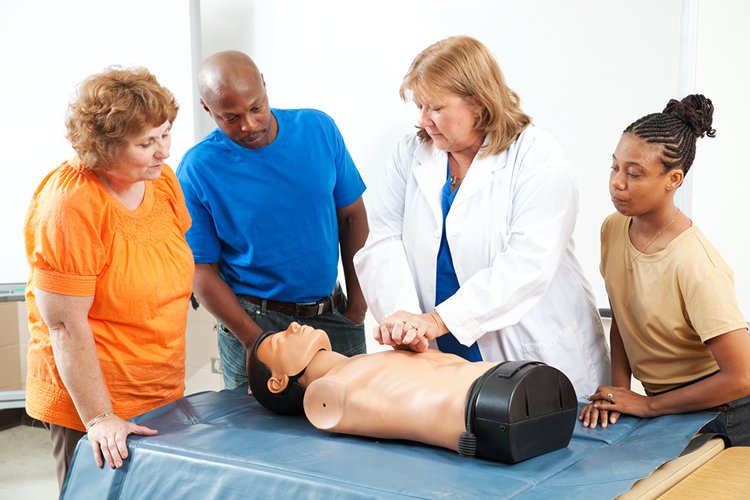The Future of Nursing After COVID-19

The COVID-19 pandemic exposed cracks that have long existed in the U.S. healthcare system and highlighted the need for drastic change, especially as it relates to the future of nursing.
While a nursing shortage existed long before COVID-19, the pandemic exacerbated the crisis. Facing even longer hours, constant staffing issues and risks to their own health and safety, coupled with the emotional toll of witnessing COVID-related patient deaths, an unprecedented number of nurses hung up their scrubs.
The problem is so concerning that last year, the American Nurses Association called on the U.S. Department of Health and Human Services to declare the nurse staffing shortage a national crisis.
Current predictions show a bleak picture for the future of nursing. According to the U.S. Registered Nurse Workforce Report Card, the United States will have an RN shortage of over 500,000 by 2030. Additionally, a recent report by the National Library of Medicine estimates one million nurses will reach retirement age within 10 to 15 years.
Fortunately, a dire nursing shortage is not inevitable. It will require a thoughtful and visionary approach — one that turns the status quo inside out — but there is still time to rewrite the script and preserve the profession. Read more to find out what healthcare leaders need to consider to change the future of nursing after Covid.
Embrace Technology
Technological advances continue to transform the healthcare industry at breakneck speed. The nursing profession can utilize the latest trends and technology to reduce workload and improve patient care.
Recent technological advances that have positively impacted patients and healthcare workers during the pandemic and are certain to continue in the future include:
- Telemedicine: This is one of the most exciting and transformative outcomes of the pandemic, and telemedicine will play a key role in improving the future of nursing after Covid. At the beginning of the pandemic, telemedicine helped keep patients, nurses and doctors safe by reducing and even eliminating exposure to the coronavirus. It also made it possible for clinicians to provide care for patients in need no matter where they lived, thus increasing access for those in remote areas.
- Electronic health records (EHRs): Paper charts are now nearly as obsolete as phonebooks. EHRs are the new norm and provide many advantages for caregivers and patients, including easy access to patient history, clinical reminders and increased patient participation.
- Wearables: Wearable medical devices, like heart monitors and ECG monitors, allow patients to leave the hospital and still receive quality care from a nurse or doctor who monitors the patient virtually. Wearables are increasing efficiency, freeing up hospital beds and helping nurses and doctors gain insight into patients’ physiological systems like never before.
Provide Nurses With a Better Work/Life Balance
Even before the pandemic hit, nurses were experiencing unhealthy levels of fatigue. The most significant contributor to nurse burnout is working in a stressful working environment. According to the 2018 NSSRN data, 32% of nurses who left their job in 2018 stated that burnout was their reason for leaving. Undoubtedly, increased stress during the pandemic only worsened the exhaustion.
Nurses often face extremely demanding schedules, working 10 to 12 hours at a time with limited breaks and frequent overnight shifts. A study conducted by the National Academy of Medicine found that nurses who work 10-hour shifts or longer are much more likely to experience burnout. This not only leads to staffing issues and adverse patient outcomes; it also contributes to mental health problems, like anxiety, depression, suicide and drug and alcohol abuse.
In addition to addressing immediate issues regarding work-life balance, it's essential to consider how the emerging workforce values a work-life balance. As more experienced nurses begin to retire, millennials will soon make up the majority of the workforce.
More than 80% of millennials say they seriously consider how a job will affect their work-life balance before accepting a position.
Given these stats, it’s clear the future of nursing depends on achieving a healthier work-life balance.

Education’s Role in The Future of Nursing
Solving the nursing shortage problem goes beyond just recruiting more nurses. In addition to the shortage of nurses needed to work in the field, there is also a shortage of professors needed to educate nursing students. This is especially true in rural communities where there is limited access to secondary education. An educator shortage has left nursing students competing for limited availability in nursing programs worldwide.
To close these gaps, we must embrace online education as the future of nursing. Research backs up the effectiveness of online learning success in higher education. According to ThinkImpact, students can retain 25% to 60% more information with online classes in comparison to 8% to 10% while in the classroom.
In addition to the cognitive benefits of online learning, distance learning and hybrid learning programs allow students to learn online and complete clinical placements in their communities. Online nursing programs also make it easier for students with families, those with full-time jobs, or workers looking to switch career paths and join the noble profession of nursing. Additionally, online classes are more cost-effective for students who can’t afford to relocate to a higher-education campus.
Nurses in Leadership Positions
Due to their ability to work with a variety of patient and provider personalities and manage a crisis in real-time, nurses make excellent leaders. Despite this, nurses are the least represented profession in top leadership positions across governments and ministries of health. In fact, according to the World Health Organization’s State of the World’s Nursing Report, only 50% of countries have a government chief nursing officer position.
As we witnessed during the Covid-19 pandemic, nursing leadership is desperately needed and exceptionally valuable.
The future of nursing after COVID requires us to realize and reward the unique ability of nurses to examine the entirety of a problem and propose solutions. Common personality traits like empathy, attention to detail and optimism are also incredibly valuable leadership characteristics.
Address the Gender Pay Gap in Nursing
The gender pay gap between female and male registered nurses widened even more during the pandemic, according to a report released in 2021 by Nurse.com and Relias. Although women overwhelmingly dominate the nursing field, male nurses still make more money than female nurses.
The report shows that in 2021, median annual salaries for male RNs were $14,000 higher than for female RNs with the same education and qualifications. The gap between male and female RNs was $7,297 in 2020, indicating the problem worsened during the pandemic.
Closing the gender pay gap poses a unique challenge to every industry and will undoubtedly play a role in the future of nursing after COVID.
Embark on a New Nursing Career
You can positively influence the future of nursing by considering a career in the nursing profession.
Whether you are considering becoming an RN or want to take your nursing career to the next level with a master’s or a doctorate in nursing, there are numerous online programs and certificates available at Wilkes University.
Take the next step in your career today and check out the online nursing degree opportunities available at Wilkes University.




